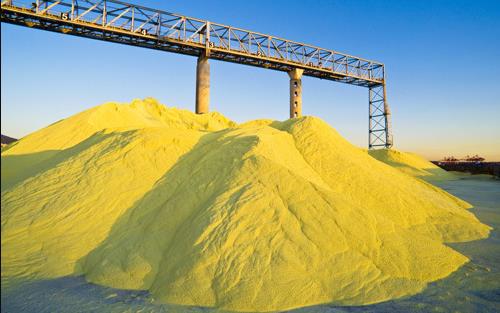Insoluble sulfur is a transparent, amorphous chain-like elastic sulfur obtained by heating sulfur powder to boiling (444.6 degrees Celsius) and quenching it in cold water. It can also be obtained by diluting superheated sulfur vapor with inert gas, spraying it in cold water mist and cooling it below 90 degrees Celsius, or dissolving sulfur block in ammonia and spray drying it immediately. Because most of it (65%~95%) is insoluble in carbon disulfide, it is called insoluble sulfur.
Properties of Insoluble Sulfur
The appearance of insoluble sulfur is yellow powder, and its chemical properties are flammable and non-toxic. It is an allotrope left after the self-polymerization reaction of ordinary sulfur at high temperature. The biggest difference between insoluble sulfur and ordinary sulfur is that it is neither soluble in carbon disulfide nor rubber. It is chemically and physically inert, can be evenly dispersed in the rubber compound, effectively reduces the aggregation of sulfur, reduces the scorching tendency of the rubber compound during storage, and prevents frosting on the surface of rubber semi-finished products and rubber products, thereby improving adhesion and ensuring light color The appearance quality of the product.
Because it is insoluble in rubber, it is not easy to produce early vulcanization and sulfur spraying in the rubber compound, and will not damage the adhesiveness of the rubber compound, so that the grouting process can be eliminated, gasoline can be saved, and the environment can be cleaned. At the vulcanization temperature, the insoluble sulfur turns into common sulfur to exert its vulcanization effect on rubber. Generally used for particularly important products, such as steel wire tires, etc.
Market for Insoluble Sulfur
Insoluble sulfur is an essential vulcanizing agent for high-performance rubber products and radial tires. At present, the company with the largest production capacity in the world is Eastman Chemical of the United States, which adopts a continuous production process; followed by Shikoku Chemical of Japan. my country’s annual import volume is about 40,000 tons. At present, the insoluble sulfur of most domestic enterprises is produced by the batch method. Only Shandong Yanggu Huatai Chemical Co., Ltd. has successfully developed a continuous method of production. Currently, there are two continuous insoluble sulfur production lines with an annual production capacity of 40,000 tons.
The preparation method of insoluble sulfur
1. Gasification method
2. Contact method
3. Radiation method
4. Low temperature liquid phase method
Application of Insoluble Sulfur
1. The most important application is as an accelerator and crosslinking agent in the rubber industry;
2. In the tire industry, a large amount of accelerators and crosslinking agents are needed, which are indispensable and important additives. IS integrates practicability and appearance requirements, and is widely used in some products bonded with rubber and structure, such as white sidewall rubber, retread tire, buffer rubber, rubber hose, carcass rubber, tape, in the “non-spray Frost” at the same time, to ensure the appearance of rubber semi-finished products.
3. The application market of IS products is very extensive. IS can be found in rubber products such as cable casings, waterproof hoses, oil sealing materials, raw tapes, automotive inner tubes, insulation protection products, and automotive interior parts.
4. In addition to industrial applications, it is also widely distributed in daily necessities. Common light-colored rubber products on the market often require a large amount of sulfur, such as waterproof rubber shoes, special rubber products such as seals commonly used in hydropower construction, and household rubber products, toys, latex gloves and other advanced rubber products. IS can improve the bonding ability between rubber layers, greatly improve the quality of common rubber products, and prolong the service life. Compared with ordinary sulfur, it has many unique advantages.
5. In addition to the tire industry, its application fields also include energy and environmental protection, fabric dyes, pesticide reagents, metallurgical industry and other fields.

